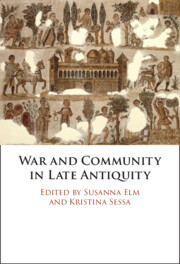Refine search
Actions for selected content:
24618 results in Ancient history
Acknowledgements
-
- Book:
- Mycenaean Civilization
- Published online:
- 19 December 2025
- Print publication:
- 15 January 2026, pp xvi-xvi
-
- Chapter
- Export citation
Index
-
- Book:
- Mycenaean Civilization
- Published online:
- 19 December 2025
- Print publication:
- 15 January 2026, pp 702-730
-
- Chapter
- Export citation
Abbreviations
-
- Book:
- Mycenaean Civilization
- Published online:
- 19 December 2025
- Print publication:
- 15 January 2026, pp 581-595
-
- Chapter
- Export citation
Further Reading
-
- Book:
- Mycenaean Civilization
- Published online:
- 19 December 2025
- Print publication:
- 15 January 2026, pp 596-670
-
- Chapter
- Export citation
8 - The Mycenaean World
-
- Book:
- Mycenaean Civilization
- Published online:
- 19 December 2025
- Print publication:
- 15 January 2026, pp 513-538
-
- Chapter
- Export citation
9 - The End of Mycenaean Civilization
-
- Book:
- Mycenaean Civilization
- Published online:
- 19 December 2025
- Print publication:
- 15 January 2026, pp 539-565
-
- Chapter
- Export citation
3 - The Late Helladic II Period
-
- Book:
- Mycenaean Civilization
- Published online:
- 19 December 2025
- Print publication:
- 15 January 2026, pp 179-237
-
- Chapter
- Export citation

The Cambridge Urban History of Europe
-
- Published online:
- 10 January 2026
- Print publication:
- 20 November 2025

War and Community in Late Antiquity
-
- Published online:
- 09 January 2026
- Print publication:
- 19 March 2026

Industry, Trade and the State in Ptolemaic Egypt
-
- Published online:
- 08 January 2026
- Print publication:
- 19 February 2026
Title match
ΗΡΟΔΟΤΟΥ ΙΣΤΟΡΙΩΝ Η ΠΟΛΥΜΝΙΑ
-
- Book:
- Herodotus: <i>Histories</i> Book VII
- Published online:
- 06 February 2026
- Print publication:
- 08 January 2026, pp 47-124
-
- Chapter
- Export citation
Indices
-
- Book:
- Herodotus: <i>Histories</i> Book VII
- Published online:
- 06 February 2026
- Print publication:
- 08 January 2026, pp 497-506
-
- Chapter
- Export citation
23 - Marcus Aper and the Ala Apriana
- from Part IV - Juridical and Historical Insights
-
-
- Book:
- Latin Texts on Papyrus and the Study of Classics
- Published online:
- 12 December 2025
- Print publication:
- 08 January 2026, pp 386-395
-
- Chapter
- Export citation
11 - Latin in Roman Soldiers’ and Veterans’ Private Documents
- from Part II - Philological and Linguistic Insights
-
-
- Book:
- Latin Texts on Papyrus and the Study of Classics
- Published online:
- 12 December 2025
- Print publication:
- 08 January 2026, pp 194-210
-
- Chapter
- Export citation
21 - The Contribution of CLTP to the Study of Roman Justice
- from Part IV - Juridical and Historical Insights
-
-
- Book:
- Latin Texts on Papyrus and the Study of Classics
- Published online:
- 12 December 2025
- Print publication:
- 08 January 2026, pp 362-373
-
- Chapter
- Export citation
index-group
-
- Book:
- Latin Texts on Papyrus and the Study of Classics
- Published online:
- 12 December 2025
- Print publication:
- 08 January 2026, pp 459-460
-
- Chapter
- Export citation
Index of Ancient Manuscripts
-
- Book:
- Latin Texts on Papyrus and the Study of Classics
- Published online:
- 12 December 2025
- Print publication:
- 08 January 2026, pp 471-474
-
- Chapter
- Export citation
Contributors
-
- Book:
- Latin Texts on Papyrus and the Study of Classics
- Published online:
- 12 December 2025
- Print publication:
- 08 January 2026, pp xiii-xiv
-
- Chapter
- Export citation
Index of Papyri and Parchments Preserving Documents
-
- Book:
- Latin Texts on Papyrus and the Study of Classics
- Published online:
- 12 December 2025
- Print publication:
- 08 January 2026, pp 475-479
-
- Chapter
- Export citation
15 - Latin Ostraca from Tripolitania (Assenamat, Gigthi, Bu Njem)
- from Part II - Philological and Linguistic Insights
-
-
- Book:
- Latin Texts on Papyrus and the Study of Classics
- Published online:
- 12 December 2025
- Print publication:
- 08 January 2026, pp 257-282
-
- Chapter
- Export citation
